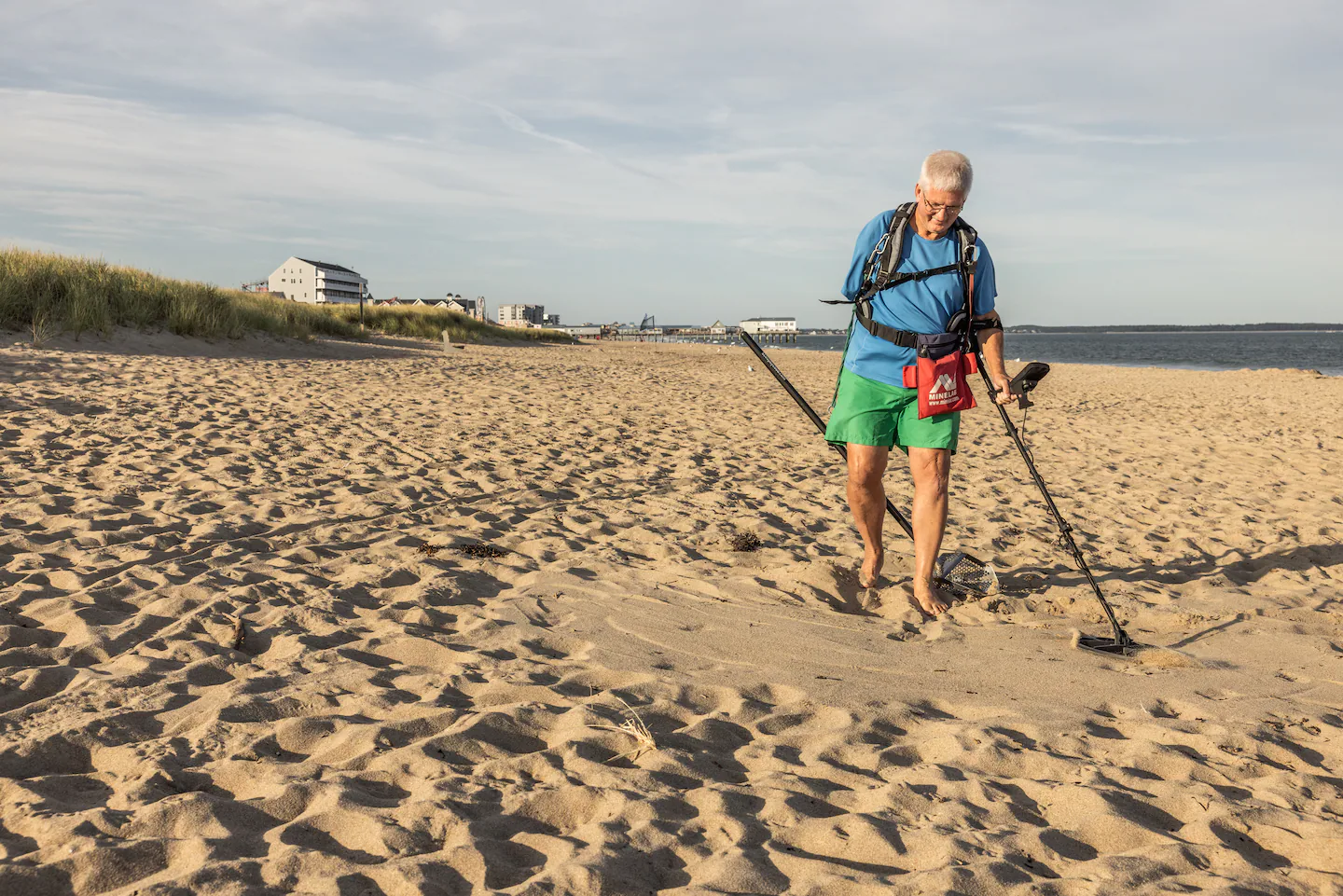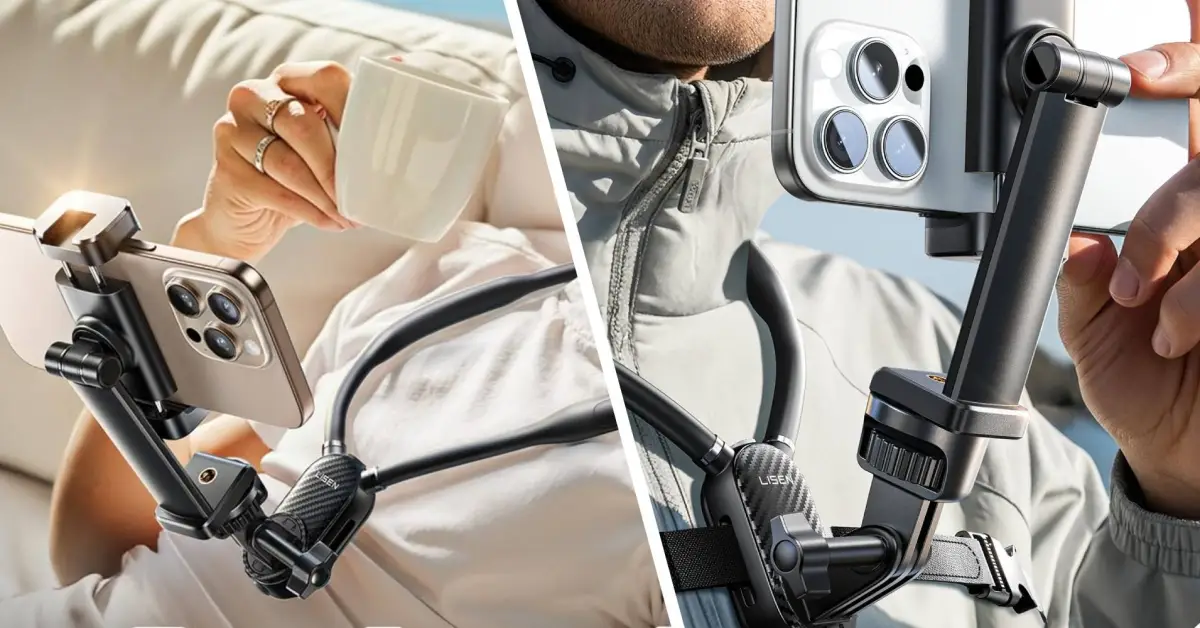
So, the Riches turned to the internet, posting about the ring on a local Facebook group. A commenter there pointed them to a more useful resource: The Ring Finders.
Founded in 2009, the site lists contact information for metal detecting experts around the world. At a moment’s notice, these “detectorists” swoop in to rescue lost treasures from the recesses of beaches and backyards and reunite them with their owners. Most ask only for a nominal fee to cover travel expenses and a reward of the owner’s discretion.
In New England, about 20 such sleuths scour the region. This past summer alone, they reported finds everywhere from Ossipee Lake in New Hampshire to Nantasket Beach in Hull to any number of locales on Cape Cod. They’re particularly busy during popular swimming months, when water temperatures are often still low enough to shrink fingers — and when the digits of newlyweds are still getting used to their new metal passengers.
Dennis Boothby was the closest Ring Finder to the Riches. Based in Saco, Maine, Boothby had quickly become one of the most active detectorists in the region since retiring from his manufacturing job four years earlier. He’d already logged 137 recoveries on The Ring Finders site when Colin Rich dialed him that day. Boothby, as usual, responded quickly.
“As soon as I get a call, I go into Ring Finder mode,” Boothby says. “I don’t even think of anything else other than getting down there and finding it.”
Like any good Ring Finder, Boothby first asks a lot of questions, including the most basic one. He sent Rich an aerial photo of York Harbor Beach divided into a numbered grid with instructions to approximate where he lost the ring.
Boothby says he is successful on about 4 out of every 5 missions (so long as the item’s owner can point him in the right general direction), but water searches pose the greatest challenge. Conditions were already working against the Riches. The tide had been coming in for hours and, unlike some detectorists, Boothby isn’t a diver. He’d have to wait until the next low tide during daylight hours to search.
Arriving at York Harbor Beach the next day, his 69th birthday, Boothby made his way down to the sand gingerly; he’d had knee replacement surgery in January. The Riches were already there, prepared to look on helplessly from shore. Another detectorist had shown up, too — a friend of Boothby’s named Ed who runs the YouTube channel Maine Beach Metal Detecting. (Ed declined to give his last name for privacy reasons.) He’d seen the Riches’ Facebook post and, after hearing from the couple that Boothby was already en route, decided to come to help.
Boothby greeted everyone, shaking hands with his left; a washing machine accident when he was 4 years old had cost him his right arm. It’s part of why he’ll wield cumbersome metal detectors for hours on end for the benefit of total strangers.
“As an amputee growing up, there were a lot of things I couldn’t do, and people would help me,” he says. “But a lot of things I can do, so I want to help them now.”
Boothby knows not all detectorists are so virtuous. While those in The Ring Finders network pledge to reunite owners with their lost items, he’s heard of some greedy detectorists who scan social media for posts about lost valuables and then go snag them for themselves. “He and I are good,” Boothby said, nodding to Ed. “Ninety-nine percent of the metal detectorists are. But that one percent, they’re like looters.”
The two friends explained their process.
Ed would follow the tide out, performing a north-to-south grid search on the wet sand, while Boothby would do the same out in the water with his waterproof detector, a Minelab Excalibur II (which runs nearly $2,000 at retail).
And so a 69-year-old man with one arm and a fragile knee ventured into the chilly ocean, swinging a hefty metal detector from side to side, hoping to rescue someone’s lost treasure.
Ever since 1881, when Alexander Graham Bell’s fledgling metal detector failed to pinpoint a bullet lodged in President James A. Garfield, metal detectorists have attracted skepticism.
Ring Finders founder Chris Turner has worked to change that perception. As a kid growing up in Vancouver, Turner liked to hunt for silver and gold coins and, when he was 12, even found a neighbor’s lost engagement ring. With time on his hands after retiring from his career as a professional soccer goalkeeper (which included four appearances for the Canadian national team in the early ’80s), he could devote more attention to all those requests to help people find missing jewelry. It occurred to him that his hobby could be something more. Turner worked for two decades as the original Ring Finder, so to speak, before launching his global directory in 2009. Ring Finders currently has about 300 members, each paying $195 annually to be listed (plus an additional $100 per location if they want to be listed in multiple spots). Turner says he speaks with every one of them to ensure they have the requisite experience.
“People just think, Oh, we’re old guys with metal detectors,” Turner says. “These guys are like modern-day superheroes, how they jump in their car, go out and help somebody.”
For many, that rush of helping someone is what keeps them going back. “When you can return that ring and see the person’s face, that is worth an unbelievable amount,” says Falmouth resident Brian Tucholke, a scientist emeritus at the Woods Hole Oceanographic Institution, who has been a Ring Finders member for five years.
Boothby started metal detecting about 25 years ago, after his daughter, Sydney, lost interest in the device he’d gifted her. After working night shifts at the manufacturing company Nichols Portland, he often couldn’t sleep. So he’d drive to nearby Old Orchard Beach at 3 or 4 a.m. and wave the detector over its 7 miles of sandy shoreline.
Initially, he viewed the activity as an opportunity to be alone with his thoughts. “You can just peace out,” he says. Back then, people carried around quite a bit of change for the arcade at Palace Playland and other amusements along the pier. On a good day, he’d come home with $10 or $15 — he even pocketed $700 one year. The detector more than paid for itself.
But before long, he began to wish he could locate the owners of some of the more unique items he unearthed. Once, in 2006, he found a gold necklace with a jade Buddha and a gold heart pendant attached to it. When no one claimed it online, he locked it away in a safe. Back then, Facebook was not in wide use, so he’d post on Craigslist and hope for the best.
Boothby signed up for The Ring Finders in 2022 after hearing about it from fellow Maine detectorist Sean Kelly, a diver. While the site leads him and others to many forms of jewelry and artifacts, Boothby estimates about 70 percent of his recoveries these days are rings. He wasn’t surprised to learn the Riches were newlyweds — “the rings don’t fit right” at first, he says. On the other end of the matrimonial spectrum, detectorists report also meeting a lot of tossers — spouses who’ve flung their rings during quarrels.
Being a Ring Finder has boosted Boothby’s profile. His companion Facebook page has gained thousands of followers.
That’s how Han Tu, of Worcester, discovered him last year. He commented on one of Boothby’s posts in May, asking if he’d ever discovered a gold necklace with a Buddha he’d lost while swimming at Old Orchard Beach on a family vacation. Boothby wasn’t sure at the time; he recalled finding something similar, but his safe was broken. He finally got it fixed and, six months after seeing the comment, drove to Tu’s home in Worcester to surprise him. The necklace with the jade Buddha had been a graduation gift from Tu’s family and the gold heart pendant was a gift from a friend. She had given him the heart just before dying in a car crash. When Boothby delivered the necklace, Tu broke down in tears.
When Boothby thinks about that moment, he says, “I get goose bumps again.”
Determination is one of two secrets to being a good Ring Finder, according to Boothby. Committing to a particular direction in a grid search, moving slowly, and never losing focus isn’t as easy as it sounds. In the water at York Harbor Beach, Boothby couldn’t drag his sand scoop — essentially, a sand sifter crossed with a shovel — behind him like he would on shore to mark his path, so he aligned himself with landmarks along the rocky coastline to ensure he remained in a straight line during each pass. Walking parallel to shore, he worked glacially, swinging the detector in short arcs around his feet (much narrower than the ones he could sweep out on land). As the surf rose up to his chest, his detector and sand scoop disappeared beneath the surface of the water.
“It’s a very demanding thing to be able to swing your detector, find something and set it down, get a scoop and do everything with one arm,” says Kelly, his fellow Ring Finder. “It’s really amazing.”
Boothby says his other secret to success is availability. “I’m retired,” he says, “so I can get up and leave as soon as somebody calls me.”
Cheryl Boothby is well aware. She doesn’t always accompany her husband on these quests, but she decided to join him for his birthday. “It’s hard to make plans,” she says from shore. “He gets antsy.”
As she watched him weather the waves on an overcast day, she wondered if he was cold; Boothby was wearing just a T-shirt and bathing suit.
He was, in fact, freezing. But the temperature of the sea was less of a concern to him than its height. At one point, he motioned to Cheryl to yell out the time. He’d been searching for about 45 minutes. Soon, the waves would break over his head. And the tide wouldn’t be low enough again to resume his search for several days.
Still, Boothby stayed the course. His headphones emitted a low hum as he plodded along. When his detector crossed over a piece of metal within a foot or so of the water’s sandy bottom — which could happen frequently in a region littered with shards of old lobster pots — he heard a tone. Boop. His Excalibur II could distinguish between iron and other metals; the tones were different. He knew what a loud, low sound meant.
Planting his right foot on the target, he dug his long-handled scooper into the sand and pulled it up out of the water to examine his find. He slumped as he sifted through the haul: He’d unearthed only a sand dollar and some rocks.
He was still hearing the tone in that same spot, though, so he dug deeper. This time, after lifting the scooper, he raised his arm skyward, like a linebacker celebrating a recovered fumble.
Between his fingers was a gold wedding ring.



